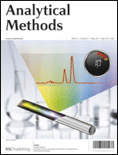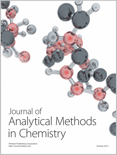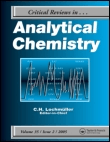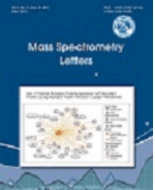
ANALYTICAL AND BIOANALYTICAL CHEMISTRY
metrics 2024
Fostering Global Collaboration in Analytical Chemistry
Introduction
ANALYTICAL AND BIOANALYTICAL CHEMISTRY, published by SPRINGER HEIDELBERG, is a leading international journal that serves as a vital platform for innovative research in the fields of analytical and bioanalytical chemistry. With an impressive impact factor and ranking in the Q2 category for both Analytical Chemistry and Biochemistry, the journal highlights key advancements and methodologies that drive the discipline forward. Established in 1996 and continuing vigorously into 2024, it has gained significant recognition with Scopus rankings placing it in the 83rd and 78th percentiles within its categories, underscoring its impact and relevance. The journal's commitment to open access facilitates widespread dissemination of critical scientific knowledge, making it an essential resource for researchers, professionals, and students dedicated to exploring the complexities of chemical analysis. With its base in Heidelberg, Germany, ANALYTICAL AND BIOANALYTICAL CHEMISTRY continues to inspire and influence the global research community.
Metrics 2024
 0.69
0.69 3.80
3.80 3.80
3.80 192
192Metrics History
Rank 2024
Scopus
IF (Web Of Science)
JCI (Web Of Science)
Quartile History
Similar Journals

BMC Chemistry, published by BMC, is a reputable open access journal that has made significant strides since its inception in 2019. Operating under e-ISSN 2661-801X, this journal is dedicated to advancing the field of general chemistry by promoting high-quality research across various sub-disciplines. Headquartered in the United Kingdom, BMC Chemistry boasts a commendable impact factor and is classified in Q2 within the prestigious field of Chemistry (miscellaneous) according to the 2023 category quartiles. The journal's Scopus ranking places it at #139 out of 408 in its category, highlighting its growing relevance and influence in the academic community, with a commendable 66th percentile standing. With a commitment to open access, BMC Chemistry ensures that groundbreaking discoveries and innovative research are available to a global audience, fostering collaboration and development in chemistry. Researchers, professionals, and students alike will find this journal to be an invaluable resource for disseminating knowledge and driving scientific advancement.

Analytical Methods
Pioneering Research in Analytical TechniquesAnalytical Methods, published by the renowned Royal Society of Chemistry, is a distinguished journal that has been serving the scientific community since its inception in 2009. Specializing in the fields of Analytical Chemistry, Chemical Engineering, and General Engineering, this journal holds a reputable position with an impressive Q2 ranking in three relevant categories as of 2023. With its focus on innovative methodologies and advanced applications in analytical science, it aims to disseminate cutting-edge research and foster dialogue among researchers, professionals, and students. Although it is not an open access publication, it is accessible worldwide and provides critical insights into the latest developments in analytical techniques and their engineering applications. The journal also ranks highly in pertinent Scopus categories, such as being in the 77th percentile for General Engineering and 61st percentile for Analytical Chemistry, underlining its significance in advancing knowledge and practical applications in these fields. By participating in this journal, readers can expect to engage with high-quality research that influences the future of analytical practices and chemical engineering.

Separation Science Plus
Unveiling cutting-edge techniques in separation science.Separation Science Plus is an emerging academic journal dedicated to advancing the field of analytical chemistry and separation science. Published by WILEY-VCH Verlag GmbH, this journal provides a platform for researchers to disseminate high-quality studies and reviews that address innovative techniques and breakthroughs in separation methodologies. With its ISSN 2573-1815, the journal has made significant inroads since its inception in 2018, encompassing a convergence period until 2024. Despite currently holding a Q3 ranking in Analytical Chemistry and a Q4 ranking in Filtration and Separation, its dedication to publishing impactful research makes it a vital resource for professionals and students alike. The journal operates under the robust scholarly reputation of WILEY, which is known for its commitment to excellence in scientific communication. Researchers interested in the latest advancements in separation techniques will find Separation Science Plus an essential read, fostering the exchange of knowledge and facilitating greater understanding within this specialized field.

Acta Chemica Iasi
Advancing Chemistry Through Open Access InnovationActa Chemica Iasi is a distinguished open-access journal dedicated to advancing the field of chemistry, published by the esteemed ALEXANDRU IOAN CUZA UNIVERSITY PRESS located in Iasi, Romania. Since its inception, this journal has served as a vital platform for the dissemination of significant research findings, theoretical advancements, and methodological innovations in various chemistry disciplines. As an open-access publication since 2013, it provides unrestricted access to high-quality articles, fostering collaboration and knowledge sharing among researchers, professionals, and students globally. Although specific metrics such as H-Index and Scopus rankings may be forthcoming, the journal's commitment to rigor and excellence ensures that it remains an invaluable resource for those seeking to stay at the forefront of chemical research. With a focus on promoting scientific inquiry and innovation, Acta Chemica Iasi continues to uphold a legacy of scholarly excellence and contribution to the chemical sciences.

Journal of Analytical Methods in Chemistry
Pioneering research in the realm of analytical chemistry.The Journal of Analytical Methods in Chemistry, published by HINDAWI LTD, stands as a premier platform dedicated to the dissemination of research in the vibrant field of analytical chemistry. With an ISSN of 2090-8865 and an E-ISSN of 2090-8873, this Open Access journal has been committed to providing unrestricted access to quality research since 1978, thereby fostering greater collaboration and innovation among researchers, professionals, and students globally. The journal showcases rigorous research insights spanning diverse categories, earning impressive Scopus rankings including Q2 in Chemical Engineering and Q3 in Analytical Chemistry for 2023, positioning itself effectively among respected peers. Its interdisciplinary approach also covers significant contributions in the realms of instrumentation and computer science applications, thus addressing contemporary challenges and advancements in analytical methodologies. By bridging theoretical underpinnings with practical applications, the Journal of Analytical Methods in Chemistry aims to catalyze knowledge exchange while enhancing the global discourse in analytical science.

Pakistan Journal of Analytical & Environmental Chemistry
Pioneering Research for a Cleaner TomorrowPakistan Journal of Analytical & Environmental Chemistry, published by the University of Sindh, National Centre of Excellence Analytical Chemistry, is a distinguished platform that has been committed to promoting high-quality research in the fields of analytical and environmental chemistry since its inception. With an ISSN of 1996-918X and an E-ISSN of 2221-5255, this journal has established itself as an open-access resource since 2007, facilitating the dissemination of knowledge to a global audience. Acknowledged for its contributions, the journal currently holds a Q4 category ranking in both Analytical Chemistry and Environmental Chemistry as of 2023, with Scopus rankings placing it within the challenging competitive bracket. The journal aims to publish original research, reviews, and technical notes that elucidate contemporary challenges and advancements, making it an essential read for researchers, professionals, and students who are exploring innovative methodologies and solutions in chemical analysis and environmental monitoring. By fostering a collaborative research environment and encouraging multidisciplinary approaches, the Pakistan Journal of Analytical & Environmental Chemistry plays a crucial role in advancing the field and addressing environmental concerns in Pakistan and beyond.

Analytical and Bioanalytical Chemistry Research
Empowering Global Knowledge in Chemistry.Analytical and Bioanalytical Chemistry Research is an esteemed open-access journal published by the Iranian Chemical Society, dedicated to the advancement of knowledge in the fields of analytical chemistry, biochemistry, and spectroscopy. Since its inception in 2014, this journal has provided a platform for researchers, professionals, and students to publish and access high-quality research articles that contribute to the understanding of chemical analysis and bioanalytical methods. With an ISSN of 2383-093X and an open-access model that promotes global dissemination of findings, it ensures that innovative research reaches a broad audience. The journal has consolidated its presence in the scientific community, currently ranked in quartile Q4 for analytical chemistry, biochemistry, and spectroscopy as of 2023. Its Scopus rankings, including a percentile of 34th in Analytical Chemistry, reflect its commitment to quality research and scholarly contribution. Situated in Tehran, Iran, the journal serves as a vital resource for academic discourse, offering insights into emerging trends and methodologies in analytical and bioanalytical chemistry.

TALANTA
Unveiling Breakthroughs in Analytical ScienceTALANTA, published by Elsevier, is a premier international journal that serves as a vital platform in the field of analytical chemistry. Since its inception in 1958, TALANTA has provided a comprehensive forum for the dissemination of groundbreaking research and developments in chemical analysis, spanning a wide array of topics including biochemistry and spectroscopy. With an impressive impact factor and ranking in the Q1 quartile within its category for 2023, it is ranked #12 out of 156 journals in Analytical Chemistry by Scopus, placing it among the most influential journals in its field. Researchers, professionals, and students benefit from its stringent peer-review process and high-quality content that drives advancements in analytical methodologies and applications. TALANTA's commitment to fostering innovation and excellence in research makes it an indispensable resource for anyone at the forefront of scientific inquiry.

CRITICAL REVIEWS IN ANALYTICAL CHEMISTRY
Fostering Collaboration and Innovation in Analytical Research.Critical Reviews in Analytical Chemistry, published by Taylor & Francis Inc, stands as a pivotal journal in the field of analytical chemistry, contributing significantly to its advancement since its inception in 1989. With an impressive Q1 ranking in the 2023 analytical chemistry category, it positions itself among the top 15 journals in the field, reflecting its high impact and relevance, as evidenced by a 90th percentile Scopus rank. This esteemed journal is dedicated to publishing comprehensive reviews that synthesize current research and emerging methods in analytical techniques, making it an invaluable resource for researchers, professionals, and students alike. With the goal of fostering innovation and collaboration, Critical Reviews in Analytical Chemistry continues to address challenges and breakthroughs within the sphere of analytical methodologies, ensuring its authors and readers remain at the forefront of scientific discovery.

Mass Spectrometry Letters
Fostering Innovation in the Heart of Mass Spectrometry.Mass Spectrometry Letters is a pioneering open-access journal published by the Korean Society for Mass Spectrometry, specializing in the diverse fields of analytical chemistry, biochemistry, and spectroscopy. Established in 2010, this journal aims to disseminate groundbreaking research and advancements in mass spectrometry and its applications across various scientific domains. Though currently categorized in the Q4 quartile in key analytical fields, Mass Spectrometry Letters serves as an essential platform for researchers, professionals, and students to share innovative methodologies, emerging trends, and practical applications of mass spectrometry, thus fostering collaboration and advancing knowledge in the scientific community. With a commitment to open access, articles published since 2010 are readily available, enabling widespread distribution and engagement within the international research community. Located in Daejeon, South Korea, and actively converging research through 2024, the journal holds the potential to grow its impact and relevance within the dynamic landscape of mass spectrometry.